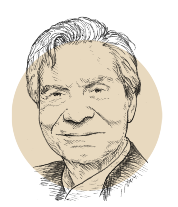Anti-Americanism is a French sport, one practiced especially by intellectuals. Seen from the left, by a French philosopher such as Régis Debray, the United States is materialist, lacking both soul and civilization. From the right, the United States fares no better: The #MeToo movement has been denounced by Catherine Deneuve, who defends the “freedom to pester.” Our education minister, Jean-Michel Blanquer, a defender of the national culture in its war against American ideological incursions, recently participated in a seminar at the Sorbonne entitled “What to Reconstruct after Deconstruction.” This was a series of anti-American diatribes that overlooked the fact that deconstruction was originally a French philosophy, represented in the 1960s by Jacques Derrida and Michel Foucault and embraced by American students. The woke movement and cancel culture were born from it – two movements that are now coming home to roost in France.
In any case, we never talk about a real America, but about an imaginary country in order to glorify certain national ideological preferences – the United States as a ball to kick around. I recall the speech by President Nicolas Sarkozy at Columbia University in 2010. To illustrate the French model, he boasted that in France, we provide healthcare to everyone, and declared: “If you come to France, and something happens to you on the sidewalk, you will not be asked for your credit card before being admitted to the hospital.” The decidedly Francophile audience applauded the president, who was apparently unaware that everyone who goes to the emergency room in the United States is cared for.
There are prejudices on both sides. I was once invited to teach economics at Stanford University, where one of my colleagues was Milton Friedman, the spokesman of unapologetic capitalism, a believer in market solutions in areas including health and education. For him, because I was French, I was inevitably socialist. For American conservatives, the whole of Europe must be socialist – a situation which the United States, with rare exceptions, is determined to avoid. Joe Biden would never accept being called a socialist. The only outlier is Senator Bernie Sanders, who is tolerated as a picturesque exception. When Friedman and I had come to know each other better, he was surprised to find points on which we agreed. Like him, I favored a universal basic income, the legalization of drugs, and the fight against bureaucratic and union monopolies that were dragging our education and healthcare down. He concluded that I was the only European who was not totally socialist.
Friedman’s opposite, another famous American economist, David Burgess, was singing the praises of French socialism a few years ago in an article for The International Herald Tribune. While living in France, he had received intensive treatment for esophageal cancer, including an endoscopy and an operation, followed by three weeks of hospitalization and a great number of chemotherapy sessions and consultations, all under the supervision of a respected doctor. “I haven’t seen a bill,” was the ecstatic response of the American conservative, who drew from this experience a fervent hymn to the French system of public health, suggesting that things should be the same in the United States. I wrote to him of my delight that our considerable taxation had made his free treatment possible. Americans can’t believe it when they discover the French level of taxation; almost half of our revenue goes through the state. This did not prevent the economist Paul Krugman from recently praising, in The New York Times, the success of the French economy in the face of the pandemic. He observed a good rate of employment along with fewer bankruptcies than in the United States. Here again we see our game of ideological football. Krugman, a Nobel laureate, knows very well that this success during the pandemic has been paid for, or will be paid for, by taxpayers in the form of future taxes or by the inflation of consumer prices.
Is it possible to arbitrate between the two camps, French and American, when each deals lightly with reality in order to criticize its own country by praising or denigrating the other? There is no point comparing cultures and histories that have engendered such contrasting social institutions. The United States, invented by pioneers, expects little from the state; European countries, conceived by monarchs, expect everything from the state. These expectations are probably too much in Europe and too little in the United States.
Some have dreamed of a convergence; this was the prophecy of Jean-Jacques Servan-Schreiber, author of The American Challenge, in 1967. Does it make sense to Americanize Europe in order to make its economy more dynamic and bring the European standard of living up to the American level, which is 25% higher? Or does it make sense to Europeanize the United States in order to give everyone access to an egalitarian health system and working hours comparable to Europe? Such convergence seems doubtful to me; it goes against our national histories and our distinct cultures. To simplify, it seems to me that Americans will always want to be “free to choose” (the title of a book published by Milton Friedman and his wife Rose in 1980) – a freedom provided by capitalism. Meanwhile, the French will always prefer security, overseen by the state. Americans will always be fans of football rather than soccer. And vice versa for the French. We will remain different, which does not mean we cannot like each other. “Our societies,” Tocqueville wrote in 1840, “differing prodigiously from each other, are not comparable.”
Editorial published in the April 2022 issue of France-Amérique. Subscribe to the magazine.












